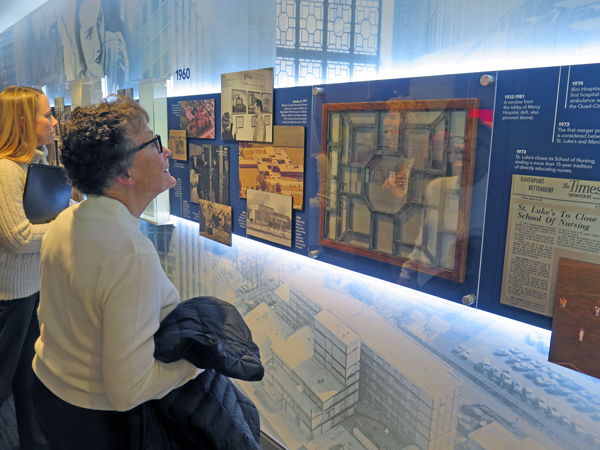
Sister Maggie Bennett, CHM, views the history wall unveiled Dec. 7 at Genesis Health System East campus in Davenport.
By Tim Walch
First responders — today we salute the doctors, nurses and emergency workers who have done so much for us during this COVID-19 pandemic and they more than deserve our praise and appreciation. Missing from this acknowledgement, however, is another group of first responders — women religious.
Women religious? Yes, I mean those exceptional sisters who have cared for the ill and the indigent in this country for almost 300 years. Today, there are over 600 Catholic hospitals and 1,400 Catholic health care centers in this country — many of them established by women religious. The vast majority of these institutions are in the thick of the fight against COVID-19.
It’s a health care commitment that goes back to 1727 when the first Catholic hospital was established in New Orleans and it’s a ministry that has increased every year since. More often than not, women religious established and staffed these hospitals and were the first to respond to epidemics of smallpox, cholera and tuberculosis.
Here in Iowa, the story of Catholic health care begins with a small group of Mercy Sisters who settled in Davenport in 1869. Led by Mother Mary Borromeo Johnson, the sisters embraced a calling to serve all those in need of health care without regard to their religious faith. From these roots came multiple Mercy hospitals across the state.
Mother Borromeo quickly told public officials in Scott County her vision for assisting citizens in need for health care without regard to their religious affiliation. “Our main object,” she stated boldly, “will be the relief of suffering in all its forms — not as an object of speculation or for a profit, but that it may prove a general public benefit.” This was a public service for all patients.
That Mother Borromeo was a strong, articulate and compassionate woman gained substantial notice. Although she stayed in Davenport for only seven years, she made quite an impact. “She knows how to deal with men,” was a common description of Mother Borromeo.
In 1873, as some Mercy sisters expanded facilities in Davenport, other sisters boarded a train to Iowa City. Once again these nuns were responding to a health care challenge. This time it was a request from the dean of the new medical school at the University of Iowa. He had called on the order to establish facilities in Iowa City to assist a wide variety of patients.
The contingent was led by Mother Mary Catherine Slattery who later moved on to establish the Mercy Sisters in Fort Dodge. She was succeeded by Mother Mary Isadore who had previously established the Mercy sisters in Independence and Cedar Rapids before coming to Iowa City. She would remain in Iowa City until her death in 1899.
The Sisters of Mercy were just one among many orders who cared for the sickest among us and who immensely improved the quality of life for all Iowans. Among the other orders of women religious devoted to health care were the Sisters of Charity, the Benedictine Sisters, the Franciscan Sisters and the Sisters of Humility. Additional orders established and staffed hospitals in other states.
The impact of women religious was substantial and a sizable element in the foundation of health care in this country in general and in this state in particular. In like manner, these sisters also contributed to the general growth of opportunities for young women to receive an education in health care with a special emphasis on nursing. In fact, women religious were role models for tens of thousands of health care workers who are on the front lines today.
So when we praise “first responders” let’s remember the women religious who have done so much to keep us healthy for nearly 300 years. We continue to see the manifestation of God’s mercy in their hospitals and health care centers. Thank you, sisters, for being at our bedsides!
(Timothy Walch is a lay director of St. Thomas More Parish in Coralville and a member of the Board of Directors of The Catholic Messenger.)
Support The Catholic Messenger’s mission to inform, educate and inspire the faithful of the Diocese of Davenport – and beyond! Subscribe to the print and/or e-edition, or make a one-time donation, today!











